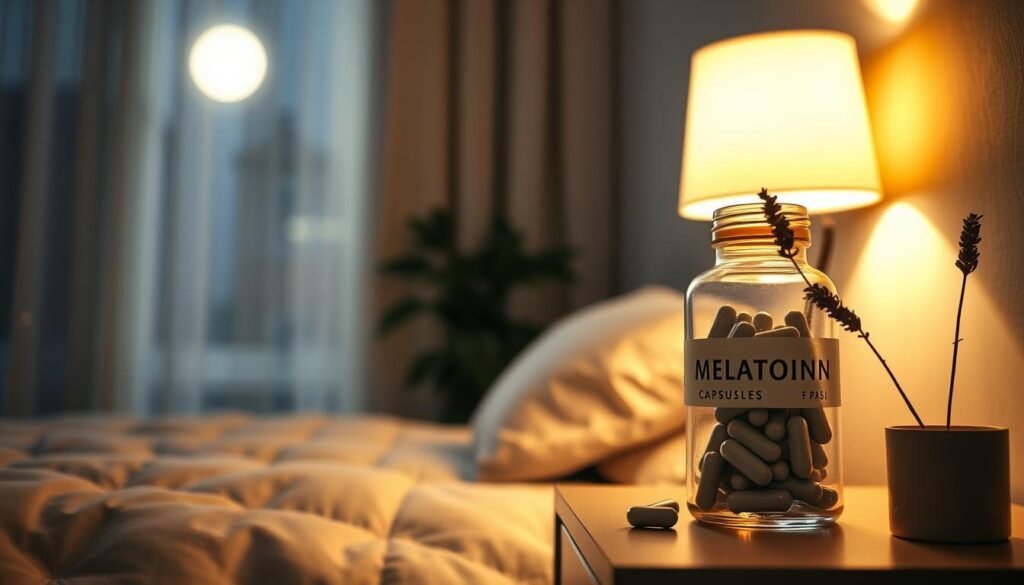Did you know anxiety disorders impact 2.5% to 7% of people? That’s millions dealing with anxiety’s tough effects. Over 70 million Americans have chronic sleep problems. The link between sleep issues and anxiety is clear. Melatonin is gaining attention as a sleep aid and a possible solution for anxiety. This guide looks at the science behind melatonin and how it might help those with anxiety.
Melatonin could be a safe choice for anxiety relief, unlike some drugs that can cause addiction. It’s a natural option that may help with anxiety symptoms and sleep. Including melatonin in a stress plan could improve emotional well-being. The potential benefits of melatonin for anxiety are promising.
Wondering if melatonin can help with anxiety? This guide covers its benefits, proper doses, and safety. It aims to show how melatonin might manage anxiety naturally.
Key Takeaways
- Anxiety disorders affect 2.5% to 7% of the population.
- Over 70 million Americans suffer from chronic sleep issues.
- Melatonin has shown anxiolytic action in various studies.
- Melatonin is non-habit forming and less likely to cause dependence.
- Optimal dosage for anxiety relief is often recommended to start at 5 mg or lower.
- Research indicates melatonin’s potential effectiveness in reducing anxiety linked with surgery.
- Integrating melatonin into a stress management plan may enhance overall mental health.
Introduction to Melatonin and Anxiety
Melatonin is made by the pineal gland and helps control sleep. Poor sleep can make anxiety worse. Since many in the U.S. battle anxiety, finding natural treatments is key. Addressing sleep issues can help ease anxiety, underlining the effects of melatonin on it.
Recent studies show melatonin might help with anxiety. It can help people sleep better and feel less anxious. This creates a positive cycle of improved sleep and mood. Moreover, melatonin for anxiety is an easy-to-find natural treatment.
When using melatonin, it’s important to know the right amount to take. Short-term use is usually safe and may help with sleep issues linked to anxiety. This includes problems like generalized anxiety disorder and panic attacks. But, we need more research to fully trust melatonin for long-term anxiety management. It shows we have a lot to learn about sleep and mental health.
What is Melatonin?
Melatonin is key in managing our sleep-wake schedule. It’s made by the pineal gland. It tells the body when to get ready for sleep. Understanding how melatonin works helps us see how it affects sleep and health.
Understanding the Hormone
Melatonin controls our sleep patterns and is highest when it’s dark. Its levels help us sleep well, which is important for being clear-headed and emotionally stable. As we get older, we make less melatonin. This can make it harder to sleep well. Diseases like Alzheimer’s and type 2 diabetes can lower melatonin too, making sleep issues worse.
How Melatonin is Produced
Melatonin is made from the amino acid tryptophan in the pineal gland. This happens mostly in the dark, peaking between 2 and 4 in the morning. This timing matches our body’s sleep cycle. But, light at night, especially blue light from screens, can mess with melatonin production. This can make keeping a healthy sleep schedule hard.
| Factor | Impact on Melatonin Production |
|---|---|
| Advancing Age | Reduces melatonin levels |
| Diseases (e.g., Diabetes, Alzheimer’s) | Can contribute to lower production |
| Nighttime Light Exposure | Diminishes melatonin production |
Can Melatonin Help with Anxiety?
Recently, the interest in melatonin for anxiety relief has increased. Studies show it might help ease anxiety symptoms, especially before surgery. It seems to work as well as some common anxiety drugs.
Research on Melatonin and Anxiety Relief
A 2020 review showed melatonin could significantly lower anxiety before surgery. It worked as well as benzodiazepines but without their side effects. A study from 2018 found that it not only eased anxiety but also helped people sleep better during stressful times.
This research suggests melatonin could be a good treatment for anxiety. It seems to cause fewer unwanted effects compared to other treatments.
Melatonin’s Role in Anxiety Disorders
For people with anxiety disorders, melatonin might be useful. It has calming effects in stressful situations. A 2022 review found it affects biological processes linked to anxiety. This means it could offer real benefits for treating anxiety with few negative side effects.
| Study Year | Findings | Relevance to Anxiety |
|---|---|---|
| 2020 | Melatonin effective in reducing preoperative anxiety compared to placebo and benzodiazepines. | Supports use in surgical patients. |
| 2018 | Improved anxiety and sleep patterns in acute coronary syndrome patients. | Demonstrates broader application beyond surgery. |
| 2022 | Interacts with biological causes of anxiety, minimal side effects noted. | Encourages consideration of melatonin for anxiety relief. |
Melatonin shows promise as an anxiety treatment. For more info on natural remedies, check out natural herbal options for anxiety that work well with melatonin.
Mechanisms of Melatonin in Reducing Anxiety
To understand how melatonin helps ease anxiety, it’s key to look at its mechanisms. It’s linked closely to GABA levels and their effects on the brain. As GABA acts to keep neurons calm, its increase, supported by both GABA and melatonin, effectively lowers anxiety symptoms.
Influence on GABA Levels
Melatonin boosts GABA’s calming impact on the brain. This is done by melatonin latching onto certain brain receptors. This action helps to release more GABA. As a result, people prone to anxiety feel more at peace. The boost in GABA helps in handling stress and anxiety, making melatonin a helpful tool for those needing relief.
Impact on Sleep Quality
Poor sleep can make anxiety worse. Melatonin is vital for a good sleep cycle. It seems taking melatonin helps people sleep better, which in turn lessens anxious feelings. Because bad sleep can increase anxiety, improving sleep with melatonin can break this cycle. This results in better mental health overall.
| Effect | Influence on Anxiety | Impact on Sleep Quality |
|---|---|---|
| Increased GABA | Reduces anxiety symptoms | Enhances sleep onset |
| Calming Neurotransmitter Actions | Aids in managing stress | Promotes uninterrupted sleep |
| Regulation of Sleep Cycles | Supports emotional stability | Improves overall sleep quality |
Melatonin Benefits Beyond Sleep
Melatonin isn’t just for sleep. It helps with many health areas, especially mental health and wellness. If you’re feeling anxious, melatonin could be a natural solution. It helps reduce stress and boosts overall well-being, doing more than just improving your sleep.
Additional Psychosomatic Benefits
Research shows melatonin benefits go beyond sleep. They help with mental health too. These benefits include:
- Lowering mental stress.
- Possibly making you feel better, similar to antidepressants.
- Making your emotions more stable.
Studies suggest melatonin helps bring peace and calm. For those with anxiety, it might ease symptoms and bring relief.
Reduction in Preoperative Anxiety
For surgery, melatonin can help with anxiety relief before surgery. It’s shown to work well for surgical anxiety intervention. For those scared before surgery, it might help as much as standard anxiety medicines. Melatonin can make the surgery experience less worrying, leading to better outcomes.
Optimal Melatonin Dosage for Anxiety Relief
Finding the right melatonin dosage can greatly ease anxiety. People find that melatonin needs vary, from 0.1 to 10 milligrams. This range means you can adjust based on your health and how you react to melatonin. Taking melatonin 30 minutes before sleep works best.
Recommended Dosage Ranges
How much melatonin you need depends on your situation. Doctors say to start with 1-5 milligrams and see how it goes. This way, you can find your ideal dose with fewer side effects. Here’s a table showing dosage suggestions for different groups:
| Demographic | Recommended Dosage |
|---|---|
| Adults | 1 to 10 mg |
| Preschool Children | 1 to 2 mg |
| School-aged Children | 1 to 3 mg |
| Adolescents | 1 to 5 mg |
| Jet Lag | 0.5 to 10 mg (commonly 3 mg) |
Factors Influencing Dosage
Many things can change how much melatonin you should take. These include your age and natural melatonin levels. Older adults might need different amounts. It’s smart to talk to a doctor first. Other important factors are your health and any other medicines you take. For children, it’s vital to consult a doctor to protect their growth.

Side Effects of Melatonin Supplements
Thinking about using melatonin for better sleep or to ease anxiety? Know the side effects first. While it works well for many, some people might have mild or even serious reactions. Knowing what could happen helps you be careful with melatonin.
Common and Mild Side Effects
Common issues with melatonin are:
- Headaches
- Dizziness
- Nausea
- Daytime drowsiness
Sometimes, people have vivid dreams, feel irritable, or sad for a short time. Most side effects are not too bad. But, listen to your body and talk to a doctor for advice, especially if you have health conditions.
Serious Side Effects and Interactions
Rare but serious problems can include:
- Confusion or disorientation
- Increased risk of falls
- Seizures
- Mood swings
Medicines for conditions like blood pressure, depression, or blood clotting could react with melatonin. Always check with a doctor before mixing melatonin with other medications to avoid bad reactions.
Melatonin might help with sleep and anxiety, but being well-informed about side effects is crucial. Always consult a healthcare professional before starting melatonin supplements. It ensures you’re using it safely and effectively.
Natural Remedies for Anxiety: Melatonin Alternatives
Looking into herbal remedies for anxiety and natural alternatives can be very helpful. People who want to feel less anxious can find effective solutions. Options like herbal supplements and vital vitamins and minerals can help a lot with anxiety.
Herbal Supplements and Anxiety
Several herbal supplements are known for potentially easing anxiety. Among them are:
- Valerian root – Studies suggest that taking 300–600 mg may enhance sleep quality and address sleep disorder symptoms.
- Passionflower – This herb, whether as tea or extract, may lead to slight improvements in sleep quality, with a 5% increase noted compared to placebo.
- Lavender – Aromatherapy using lavender has demonstrated effectiveness in improving sleep quality, even in individuals without insomnia.
- Chamomile – Often consumed as tea, chamomile has long been believed to aid sleep and relaxation, although scientific support is limited.
Before trying herbal remedies for anxiety, talk to a health professional. This is crucial, especially if you are taking other medications.
Vitamins and Minerals for Anxiety Management
Certain vitamins for anxiety support mental wellness too:
- Magnesium – Lack of magnesium might link to insomnia. Magnesium, with melatonin and vitamin B, has helped treat insomnia.
- Vitamin D – It’s key for mood regulation and mental health, making it an important part of managing anxiety.
- Omega-3 fatty acids – Present in fish oil and flaxseed, they aid in reducing anxiety symptoms and boost brain health.
Dietary supplements for anxiety can be greatly beneficial. They should be part of a well-rounded diet to improve mental health and fight anxiety.

Integrating Melatonin into a Stress Management Plan
Adding melatonin to a stress management plan can help you feel better and lower anxiety. Including therapy and melatonin in your plan can tackle anxiety from different angles. This approach promotes calmness, better sleep, and fewer anxiety symptoms.
Complementing Therapy and Other Treatments
When you use melatonin with other treatments, the results can be stronger. It works well with cognitive-behavioral therapy, mindfulness, and changing your lifestyle. These methods together, especially with a melatonin routine, can improve your mental health a lot.
Establishing a Routine for Maximum Benefit
Having a regular bedtime routine is essential when using melatonin. Consistent sleep times not only make melatonin work better but also help with anxiety. Setting a fixed bedtime, making your sleeping area peaceful, and using relaxation techniques are key.
Following these stress management techniques can really lower your anxiety and boost your health. These strategies support mental health and start you on a healthier living path.
| Stress Management Techniques | Benefits |
|---|---|
| Cognitive Behavioral Therapy | Improves coping strategies and reduces anxiety symptoms |
| Mindfulness Practices | Enhances self-awareness and emotional regulation |
| Consistent Sleep Schedule | Promotes better sleep quality |
| Regular Exercise | Reduces stress and improves mood |
| Healthy Diet | Supports overall mental and physical health |
For more details on how melatonin can help with anxiety, check out this in-depth resource. Combining routines with therapy offers a solid basis for better mental health.
Research Gaps and Future Directions for Melatonin Studies
Research on melatonin has grown, but we still have much to learn. Many studies show gaps that need filling. For instance, even though a lot of the research is of high quality, there’s a shortage on sleep behavior studies, especially in healthy people. This gap shows we need more targeted research to fully understand melatonin’s benefits.
Current Limitations in Clinical Research
Clinical trials on melatonin face several problems. These include small study groups, differing doses, and no set methods. While some research shows melatonin helps certain groups like those with metabolic issues or soldiers struggling to sleep, its impact on mental health is still unclear. We need to look more into how it could help with anxiety.
Potential for Future Therapeutic Uses
There’s a lot of hope for melatonin’s future in treating stress and anxiety. Studies could reveal new uses for melatonin outside of just sleep aids. By understanding its protective benefits for the brain, ability to improve thinking skills, and its place in mental health care, we could see innovative treatments. This knowledge might lead to new treatment plans that include melatonin for better anxiety control.

Consulting Health Professionals Before Starting Melatonin
Thinking about using melatonin for anxiety or sleep issues? It’s crucial to talk to a doctor first. They can help make sure it’s safe for you, especially if you have health problems or are on other meds.
Who Should Speak to a Doctor?
If you’re in one of these groups, talking to a doctor is a good idea:
- People with chronic health conditions.
- Individuals currently on prescription medications.
- Pregnant or breastfeeding women.
- Patients with mental health disorders.
- Children and adolescents considering melatonin use.
Knowing when to see a doctor helps decide if melatonin is a good choice. This advice is key to avoiding risks with this supplement.
Possible Medication Interactions
You should know about possible drug interactions with melatonin. Some medications that might not mix well include:
- Birth control pills.
- Selective serotonin reuptake inhibitors (SSRIs).
- Caffeine and other stimulants.
- Blood thinners and various anticonvulsants.
Doctors can spot these interactions and change your treatment to reduce side effects. A detailed chat about your meds ensures you use melatonin safely.
Conclusion
Melatonin might be a key for folks fighting anxiety. It shows promise as a natural option. Nearly one in four people deal with an anxiety disorder. So, melatonin’s role is indeed worth a closer look, especially for those having trouble sleeping.
This supplement plays a part in sleep regulation and might affect serotonin levels too. Research points to it helping ease anxiety in different settings, like before and after surgery. But, remember, research is still growing, and its effects can differ from person to person.
That’s why talking to healthcare experts is crucial before you start taking melatonin. They can help ensure you’re making a safe choice in managing anxiety.
Melatonin could be a part of your overall plan to handle anxiety. It’s a natural alternative among many treatments. Looking into these options and getting the right advice is key. It helps those with anxiety find their way to calmness.